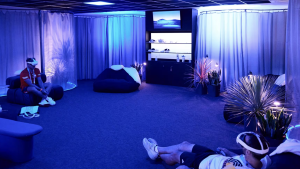- Slug–Sports: Olympians Mental Heath, 840 words.
- Photo, video available.
By Walker Smith
Cronkite News
PARIS – Even though the Paris Games are over, a commitment to the mental health of athletes is not.
While it’s the pinnacle of sporting achievement, the Olympics create a pressure-filled environment for athletes that almost no other competition can mimic. The weight of a nation, the expectations of greatness and the knowledge that this may be the only chance at gold all take a toll on an Olympian’s mental health.
The IOC and Team USA are proactive in protecting the athletes’ mental health as well as finding ways to help block out social media attacks. The Paris Olympics highlighted that mental health awareness continues to grow through therapy, high-tech relaxation and AI.
“Seventy percent of athletes only experience one Olympics,” said Kirsty Burrows, the head of the IOC’s Safe Sport Unit. “So, for us, it’s about protecting everybody and ensuring not just protection but also welfare support.”
Established in 2022, the IOC Safe Sport Unit introduced new programs and protections for athletes during and after the Olympics. According to the IOC’s website, the organization allocates $10 million per Olympiad toward mental health initiatives. This includes a helpline with 70 different languages, 148 accredited welfare officers and 41 safeguarding focal points for all international federations.
However, the IOC’s most innovative initiative uses AI technology that has grown exponentially over the past half decade. The Cyber Abuse Prevention Service is “harnessing the power of AI to provide record-breaking coverage” for Olympic and Paralympic athletes, staff and officials. The program uses AI to flag and eliminate abusive messages toward athletes across social media platforms, not including private messages.
“These are not just tools,” Kirsty said. “They’re fully integrated within our systems. So whenever something is flagged, it’s flagged to the platform for removal. There is a potential to package information that is criminal for further proceedings, and our safeguarding team is fully aware.”
Online platforms have been one of the biggest threats to athletes’ mental health since social media’s creation. Situations, such as Simone Biles getting the “twisties” – a gymnastics phenomenon that can happen while an athlete is in the air, causing them to lose their sense of direction – have given instigators excuses to send hateful messages and criticism toward athletes. Now, the IOC’s use of AI has helped mitigate that threat.
The Safe Support Unit also introduced “Athlete 365 Mind Zones” areas in the Olympic Village. Located next to the village gym, the Mind Zones used VR headsets to help athletes practice meditation as well as provide other services.
“It’s really an area that reflects our holistic mental health approach,” Kirsty said. “It incorporates mindfulness and resilience as a fundamental part of overall health.”
Mental health initiatives are also advancing outside of the IOC’s programs. At the Team USA High-Performance Center, Jessica Bartley, the USOPC senior director of psychological services, works closely with U.S. athletes to ensure their mental wellness.
Team USA has developed group and individual therapy programs for athletes, including building a popular sleep program. In addition to many offerings during the Olympics, Team USA gives access to seminars and therapy for the “post-Olympic blues” for athletes who aren’t planning to try and qualify for additional Olympics.
Team USA is allowing athletes who are working to compete in the following Olympics access to services for the whole time in between Games. Olympians not planning to compete in four years have access to the USOPC’s resources for up to two years following the Olympics. The IOC is allowing four years of access to psychologists and resources for athletes following the Paris Games.
“Mental health is so important in sports, and to have team psychologists coming to our practices and working with us all the time really helps us be at our peak performance, peak training and do our best every day,” Team USA artistic swimmer Jaime Czarkowski said.
Czarkowski says she used the Team USA therapy programs often and knows others who do as well. Positive feedback from the programs is crucial, as helping an athlete’s mental health is a two-way street.
“We’ve done a really good job of reducing the stigma,” Bartley said. “We’ve been a lot busier. Athletes are a lot more honest if they’re struggling. Over the past four years … we’ve really tried to be trusting people so we can help them with whatever comes up.”
The programs created by both entities only work if players buy in, and most have. At the Olympics, when a star the size of Simone Biles stands up for mental health awareness, it only helps the cause. After withdrawing from events in Tokyo, she has since become the face of mental health awareness and pushed more athletes to be more mindful of it.
With all the resources at their fingertips, athletes need to trust in the process, and they have at these Olympics.
“Once we’ve built trust with a handful of athletes, then the word spreads that, ‘Oh, this is a trusted resource,’” Bartley said. “This is really something that we’re able to help athletes around their mental health or their mental performance.”
For more stories from Cronkite News, visit cronkitenews.azpbs.org.
